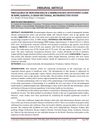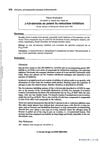 April 2016 in “Journal of Investigative Dermatology”
April 2016 in “Journal of Investigative Dermatology” A peptide known for reducing wrinkles also effectively inhibits an enzyme linked to skin inflammation and acne.
 April 2016 in “JAMA Dermatology”
April 2016 in “JAMA Dermatology” Acne is not a key diagnostic feature for PCOS, postadolescent men with acne may have insulin resistance, melanoma patients often have few moles, tumor size in CSCC indicates higher risk of serious outcomes, and hidradenitis suppurativa is linked to higher risk of heart problems and death.
 January 2016 in “Journal of the turkish academy of dermatology”
January 2016 in “Journal of the turkish academy of dermatology” Acne was the most common skin problem in kids, with other conditions like warts and eczema also frequent, varying by age and gender.
 January 2016 in “Kafkas Journal of Medical Sciences”
January 2016 in “Kafkas Journal of Medical Sciences” Turkish pregnant women commonly experienced skin issues like itching and acne, and doctors mainly used topical treatments due to safety concerns during pregnancy.
 July 2015 in “Journal of evolution of medical and dental sciences”
July 2015 in “Journal of evolution of medical and dental sciences” The most common skin diseases found were contact dermatitis, scabies, fungal infections, urticaria, and acne, highlighting the need for better public health policies and awareness.
 July 2015 in “Cambridge University Press eBooks”
July 2015 in “Cambridge University Press eBooks” Androgens like testosterone affect skin health and can lead to conditions such as acne and hair loss, with various treatments available.

Hormonal treatments can help with hair loss, acne, and excess hair growth, but it takes 3-6 months to see results and patients should know the possible side effects.
June 2014 in “Pediatrics in review” Contraceptive agents help with menstrual issues, acne, and other health conditions in teens.
 October 2013 in “The professional medical journal”
October 2013 in “The professional medical journal” Acne severity in women with PCOS is significantly associated with their serum LH/FSH ratio.
 October 2013 in “Springer eBooks”
October 2013 in “Springer eBooks” PCOS is a hormonal disorder causing infertility and menstrual problems, often linked to obesity and can lead to acne, treated with hormonal and insulin-sensitizing medications.
 August 2013 in “Fertility and Sterility”
August 2013 in “Fertility and Sterility” Hair loss is common in women with PCOS and is linked to symptoms like acne and excess hair but not to worse metabolic health.
 January 2012 in “Yearbook of Dermatology and Dermatologic Surgery”
January 2012 in “Yearbook of Dermatology and Dermatologic Surgery” Acne treatment, including isotretinoin, improves quality of life and does not worsen depression.
 January 2011 in “Yearbook of Dermatology and Dermatologic Surgery”
January 2011 in “Yearbook of Dermatology and Dermatologic Surgery” Acne and hair loss are not good indicators of hormone imbalance in PCOS, but excessive body hair is.
 January 2008 in “The European Journal of Contraception & Reproductive Health Care”
January 2008 in “The European Journal of Contraception & Reproductive Health Care” Non-daily contraceptives cause fewer side effects and are more satisfying to women, and certain oral contraceptives can treat acne and seborrhoea, with a combination of chlormadinone acetate and ethinyl estradiol being highly effective and safe.
 February 2005 in “Journal of The American Academy of Dermatology”
February 2005 in “Journal of The American Academy of Dermatology” Metabolic syndrome can cause serious health issues and should be considered when treating women with severe acne.
January 2005 in “Experimental Dermatology” Genetic factors play a major role in acne.
 July 2004 in “Clinics in Dermatology”
July 2004 in “Clinics in Dermatology” The Third World Congress of the International Academy of Cosmetic Dermatology discussed various topics like hair disorders, skin conditions, wound healing, shampoo technology, acne treatment, and the use of lasers in dermatology.
 January 2001 in “Clinical and Experimental Dermatology”
January 2001 in “Clinical and Experimental Dermatology” A test for nail fungus was most accurate with PAS stain, low-dose spironolactone helped two-thirds of acne patients, metformin reduced symptoms of HIV-related fat distribution changes with some side effects, and skin examination with dermoscopy was better at detecting abnormal moles, while temporary tattoos can cause skin reactions.
 December 1998 in “Acta Crystallographica Section C-crystal Structure Communications”
December 1998 in “Acta Crystallographica Section C-crystal Structure Communications” A new compound with strong antiandrogenic effects was found, potentially useful for treating conditions like acne and prostate cancer.
 November 1993 in “PubMed”
November 1993 in “PubMed” High levels of androgens can cause skin issues like acne, hair loss, and excessive hair growth.
 April 1992 in “Current opinion in therapeutic patents”
April 1992 in “Current opinion in therapeutic patents” New steroids were patented as effective for treating acne, hair loss, and other conditions related to hormones.
 March 1988 in “Reactions (Auckland)”
March 1988 in “Reactions (Auckland)” Birth control pills can improve or cause acne and hair issues, with improvements more common, and may affect skin pigmentation.

Diane and Androcur 10 improved acne and seborrhea in most women, and hirsutism and alopecia in about half.

Cyproterone acetate with ethynyl estradiol significantly improved acne and seborrhea in women, but was less effective for hair loss and excessive hair growth.

Anti-androgens can help treat tough skin conditions like severe acne and excessive hair growth.

Choose oral contraceptives with specific side effects to manage issues like acne and avoid unwanted effects.
 February 1976 in “PubMed”
February 1976 in “PubMed” Sex hormone therapy is effective for certain skin conditions like acne and seborrhea, but less so for female hair loss and excessive hair growth.
 July 1975 in “Archives of Dermatology”
July 1975 in “Archives of Dermatology” The document suggests a possible connection between rapid weight loss and hair loss, and reports a case of skin condition improvement after stopping acne medication.
 December 2024 in “Anti-Aging Eastern Europe”
December 2024 in “Anti-Aging Eastern Europe” PRP is effective for skin rejuvenation, hair restoration, and acne scar treatment.
December 2024 in “Health Science Reports” Topical metformin shows promise for dental and skin treatments, including periodontitis, hair regrowth, wound healing, and acne.



























